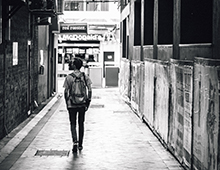 Loving one’s neighbors is a biblical mandate Breanna Lathrop has adopted in her nursing practice as well as in her personal life. As a family nurse practitioner at the Good Samaritan Health Center in Southwest Atlanta, Georgia, Breanna is invested in addressing social determinants of health as they affect neighborhoods.
Loving one’s neighbors is a biblical mandate Breanna Lathrop has adopted in her nursing practice as well as in her personal life. As a family nurse practitioner at the Good Samaritan Health Center in Southwest Atlanta, Georgia, Breanna is invested in addressing social determinants of health as they affect neighborhoods.
“Neighborhoods are making people sick,” she believes, and nurses can address and implement change by realizing that social determinants of health, such as poverty, food access, housing, and employment, affect everyone to some degree. Breanna and a colleague, Veronica Squires, describe this situation in their new book, How Neighborhoods Make Us Sick: Restoring Health and Wellness to Our Communities (IVP Books, 2019).
“There are things each of us can do in our own spheres of influence that can impact the health of our neighbors,” Breanna asserts. “Even if we make one change, think differently, or question assumptions about another’s needs and problems, we can bring about community and system level change.”
What Can Nurses Do?
Nurses have many avenues to positively impact the social determinants of health impacting individuals as well as neighborhoods. For example, when preparing to discharge a patient from the hospital, ask about their needs. Do they ever have trouble affording enough food for their household? Are they going home to a safe living situation? Challenge your health organization to start using screening tools that identify the social determinants impacting your patients.
We also can effect change in our own neighborhoods, Breanna believes. “All of us have decisions we make as part of our communities in how we vote and how we take action. For example, we have input on where to place a bus stop or a housing shelter. We tend to think of what this means for ourselves and our family. Try asking: What do these things mean for those around me who are most negatively impacted by social determinants of health?”
Answering Jesus’ Question
Breanna urges us, as followers of Christ, to ask the question Jesus did: Who is my neighbor? She believes a neighbor is whomever is in our sphere, in the ZIP code next to us, at the store with us. While many of us live in neighborhoods with access to healthy food, basic health care, safe housing, and living wage jobs, neighborhoods just blocks away might experience a very different reality. Breanna and Veronica share in the book their experiences of working and living with their families in under-resourced communities. Their experiences are eye opening, harsh, and life altering. Those years also strengthened their commitment to serve people negatively affected by social determinants of health.
“Today, positive initiatives and local level solutions are happening all over the country. The more the conversation expands [about effecting change], the more creativity we bring to the table,” Breanna said.
“If we’re open to wrestling with these questions, it’s more hopeful than wishing the questions would go away. As we seek God in this and meet the brokenness of the world with our own, it changes us and our everyday decisions.”
Breanna Lathrop, DNP, MPH, FNP-BC, is the CEO at Good Samaritan Health Center in Atlanta, Georgia, where she serves patients as an FNP.
How Neighborhoods Make Us Sick: Restoring Health and Wellness to Our Communities released in January 2019 and is available through InterVarsity Press.
Add new comment